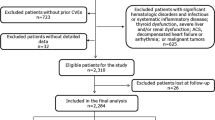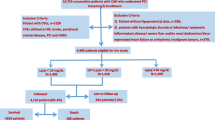Abstract
Purpose
Elevated lipoprotein(a) [Lp(a)] and diabetes mellitus (DM) are both associated with adverse events in high-risk patients with established coronary artery disease (CAD). Currently, the association between Lp(a) levels and recurrent cardiovascular (CV) events (CVEs) remained undetermined in patients with different glucose status. Therefore, this study aimed to investigate the prognostic significance of Lp(a) levels for recurrent CVEs in high-risk CAD patients who suffered from first CVEs according to different glycemic metabolism.
Methods
We recruited 5257 consecutive patients with prior CVEs and followed up for recurrent CVEs, including CV death, non-fatal myocardial infarction (MI), and non-fatal stroke. Patients were assigned to low, medium, and high groups according to Lp(a) levels and further stratified by glucose status.
Results
During a median 37-month follow-up, 225 (4.28%) recurrent CVEs occurred. High Lp(a) was independently associated with recurrent CVEs [adjusted Hazard Ratio (HR), 1.57; 95% confidence interval (CI) 1.12–2.19; P = 0.008]. When participants were classified according to Lp(a) levels and glycemic status, high Lp(a) levels were associated with an increased risk of recurrent CVEs in pre-DM (adjusted HR, 2.96; 95% CI 1.24–7.05; P = 0.014). Meanwhile, medium and high Lp(a) levels were both associated with an increased risk for recurrent CVEs in DM (adjusted HR, 3.09; 95% CI 1.30–7.34; P = 0.010 and adjusted HR, 3.13, 95% CI 1.30–7.53; P = 0.011, respectively).
Conclusions
This study demonstrated that elevated Lp(a) levels were associated with an increased recurrent CVE risk in patients with CAD, particularly among those with pre-DM and DM, indicating that Lp(a) may provide incremental value in risk stratification in this population.




Similar content being viewed by others
Data availability
The datasets used and/or analysed during the current study are available from the corresponding author on reasonable request.
References
Timmis A, Vardas P, Townsend N et al (2022) European society of cardiology: cardiovascular disease statistics 2021. Eur Heart J 43(8):716–799
Zhao D, Liu J, Wang M et al (2019) Epidemiology of cardiovascular disease in China: current features and implications. Nat Rev Cardiol 16(4):203–212
Liu H-H, Cao Y-X, Jin J-L et al (2020) Association of lipoprotein(a) levels with recurrent events in patients with coronary artery disease. Heart 106(16):1228–1235
Verma S, Bain SC, Buse JB et al (2019) Occurence of first and recurrent major adverse cardiovascular events with liraglutide treatment among patients with type 2 diabetes and high risk of cardiovascular events: a post hoc analysis of a randomized clinical trial. JAMA Cardiol 4(12):1214–1220
Hoogeveen RC, Ballantyne CM (2021) Residual cardiovascular risk at low LDL: remnants, lipoprotein(a), and inflammation. Clin Chem 67(1):143–153
Cannon CP, Blazing MA, Giugliano RP et al (2015) Ezetimibe added to statin therapy after acute coronary syndromes. N Engl J Med 372(25):2387–2397
Sabatine MS, Giugliano RP, Keech AC et al (2017) Evolocumab and clinical outcomes in patients with cardiovascular disease. N Engl J Med 376(18):1713–1722
Nguyen SV, Nakamura T, Kugiyama K (2014) High remnant lipoprotein predicts recurrent cardiovascular events on statin treatment after acute coronary syndrome. Circ J 78(10):2492–2500
Duarte Lau F, Giugliano RP (2022) Lipoprotein(a) and its significance in cardiovascular disease: a review. JAMA Cardiol 7(7):760–769
Gudbjartsson DF, Thorgeirsson G, Sulem P et al (2019) Lipoprotein(a) concentration and risks of cardiovascular disease and diabetes. J Am Coll Cardiol 74(24):2982–2994
Liu H-H, Cao Y-X, Jin J-L et al (2020) Predicting cardiovascular outcomes by baseline lipoprotein(a) concentrations: a large cohort and long-term follow-up study on real-world patients receiving percutaneous coronary intervention. J Am Heart Assoc 9(3):e014581
Cui K, Yin D, Zhu C et al (2022) Impact of Lipoprotein(a) concentrations on long-term cardiovascular outcomes in patients undergoing percutaneous coronary intervention: a large cohort study. Nutr Metab Cardiovasc Dis 32(7):1670–1680
Reyes-Soffer G, Ginsberg HN, Berglund L et al (2022) Lipoprotein(a): a Genetically determined, causal, and prevalent risk factor for atherosclerotic cardiovascular disease: a scientific statement from the American heart association. Arterioscler Thromb Vasc Biol 42(1):e48–e60
Kronenberg F, Mora S, Stroes ESG et al (2022) Lipoprotein(a) in atherosclerotic cardiovascular disease and aortic stenosis: a European atherosclerosis society consensus statement. Eur Heart J. https://doi.org/10.1093/eurheartj/ehac361
Catapano AL, Tokgözoğlu L, Banach M et al (2023) Evaluation of lipoprotein(a) in the prevention and management of atherosclerotic cardiovascular disease: a survey among the lipid clinics network. Atherosclerosis 370:5–11
Li J-J, Ma C-S, Zhao D et al (2022) Lipoprotein(a) and cardiovascular disease in Chinese population: a Beijing heart society expert scientific statement. JACC Asia 2(6):653–665
Kavousi M, Leening MJG, Nanchen D et al (2014) Comparison of application of the ACC/AHA guidelines, adult treatment panel iii guidelines, and European society of cardiology guidelines for cardiovascular disease prevention in a European cohort. JAMA 311(14):1416–1423
Saeed A, Sun W, Agarwala A et al (2019) Lipoprotein(a) levels and risk of cardiovascular disease events in individuals with diabetes mellitus or prediabetes: the atherosclerosis risk in communities study. Atherosclerosis 282:52–56
Waldeyer C, Makarova N, Zeller T et al (2017) Lipoprotein(a) and the risk of cardiovascular disease in the European population: results from the BiomarCaRE consortium. Eur Heart J 38(32):2490–2498
Zhang Y, Jin J-L, Cao Y-X et al (2020) Lipoprotein (a) predicts recurrent worse outcomes in type 2 diabetes mellitus patients with prior cardiovascular events: a prospective, observational cohort study. Cardiovasc Diabetol 19(1):111
Wang L, Gao P, Zhang M et al (2017) Prevalence and ethnic pattern of diabetes and prediabetes in China in 2013. JAMA 317(24):2515–2523
Jin J-L, Cao Y-X, Zhang H-W et al (2019) Lipoprotein(a) and cardiovascular outcomes in patients with coronary artery disease and prediabetes or diabetes. Diabetes Care 42(7):1312–1318
Zhang Y, Jin J-L, Cao Y-X et al (2020) Prognostic utility of lipoprotein(a) combined with fibrinogen in patients with stable coronary artery disease: a prospective, large cohort study. J Transl Med 18(1):373
AD Association (2022) 2. Classification and diagnosis of diabetes: standards of medical care in diabetes-2022. Diabetes Care 45(Suppl 1):S17–S38
He J, Bian X, Song C et al (2022) High neutrophil to lymphocyte ratio with type 2 diabetes mellitus predicts poor prognosis in patients undergoing percutaneous coronary intervention: a large-scale cohort study. Cardiovasc Diabetol 21(1):156
Hess CN, Clare RM, Neely ML et al (2017) Differential occurrence, profile, and impact of first recurrent cardiovascular events after an acute coronary syndrome. Am Heart J 187:194–203
Smolina K, Wright FL, Rayner M et al (2012) Long-term survival and recurrence after acute myocardial infarction in England, 2004 to 2010. Circ Cardiovasc Qual Outcomes 5(4):532–540
Feng W, Hendry RM, Adams RJ (2010) Risk of recurrent stroke, myocardial infarction, or death in hospitalized stroke patients. Neurology 74(7):588–593
Kaasenbrood L, Boekholdt SM, van der Graaf Y et al (2016) Distribution of estimated 10-year risk of recurrent vascular events and residual risk in a secondary prevention population. Circulation 134(19):1419–1429
Gencer B, Kronenberg F, Stroes ES et al (2017) Lipoprotein(a): the revenant. Eur Heart J 38(20):1553–1560
Schwartz GG, Ballantyne CM, Barter PJ et al (2018) Association of lipoprotein(a) with risk of recurrent ischemic events following acute coronary syndrome: analysis of the dal-outcomes randomized clinical trial. JAMA Cardiol 3(2):164–168
Gencer B, Rigamonti F, Nanchen D et al (2019) Prognostic value of elevated lipoprotein(a) in patients with acute coronary syndromes. Eur J Clin Invest 49(7):e13117
Sun H, Saeedi P, Karuranga S et al (2022) IDF diabetes atlas: global, regional and country-level diabetes prevalence estimates for 2021 and projections for 2045. Diabetes Res Clin Pract 183:109119
Huth C, Bauer A, Zierer A et al (2020) Biomarker-defined pathways for incident type 2 diabetes and coronary heart disease-a comparison in the MONICA/KORA study. Cardiovasc Diabetol 19(1):32
Tolbus A, Mortensen MB, Nielsen SF et al (2017) Kringle IV type 2, not low lipoprotein(a), as a cause of diabetes: a novel genetic approach using SNPs associated selectively with lipoprotein(a) concentrations or with kringle IV type 2 repeats. Clin Chem 63(12):1866–1876
Liu H-H, Cao Y-X, Li S et al (2018) Impacts of prediabetes mellitus alone or plus hypertension on the coronary severity and cardiovascular outcomes. Hypertension 71(6):1039–1046
Lawler PR, Bhatt DL, Godoy LC et al (2021) Targeting cardiovascular inflammation: next steps in clinical translation. Eur Heart J 42(1):113–131
Mach F, Baigent C, Catapano AL et al (2020) 2019 ESC/EAS Guidelines for the management of dyslipidaemias: lipid modification to reduce cardiovascular risk. Eur Heart J 41(1):111–188
Willeit P, Ridker PM, Nestel PJ et al (2018) Baseline and on-statin treatment lipoprotein(a) levels for prediction of cardiovascular events: individual patient-data meta-analysis of statin outcome trials. Lancet 392(10155):1311–1320
Waldmann E, Parhofer KG (2016) Lipoprotein apheresis to treat elevated lipoprotein (a). J Lipid Res 57(10):1751–1757
O’Donoghue ML, Fazio S, Giugliano RP et al (2019) Lipoprotein(a), PCSK9 inhibition, and cardiovascular risk. Circulation 139(12):1483–1492
Szarek M, Bittner VA, Aylward P et al (2020) Lipoprotein(a) lowering by alirocumab reduces the total burden of cardiovascular events independent of low-density lipoprotein cholesterol lowering: ODYSSEY OUTCOMES trial. Eur Heart J 41(44):4245–4255
Tsimikas S, Karwatowska-Prokopczuk E, Gouni-Berthold I et al (2020) Lipoprotein(a) reduction in persons with cardiovascular disease. N Engl J Med 382(3):244–255
Koren MJ, Moriarty PM, Baum SJ et al (2022) Preclinical development and phase 1 trial of a novel siRNA targeting lipoprotein(a). Nat Med 28(1):96–103
He J, Song C, Wang H et al (2023) Diabetes mellitus with mild or moderate kidney dysfunction is associated with poor prognosis in patients with coronary artery disease: a large-scale cohort study. Diabetes Res Clin Pract 200:110693
Funding
This study was supported by CAMS Innovation Fund for Medical Sciences (CIFMS) (2021-I2M-1-008).
Author information
Authors and Affiliations
Contributions
JH and MY contributed to the study design and interpretation of the results. CS, RZ, and SY contributed to the collection, analysis, or interpretation of data. JH and MY prepared the manuscript. JL and KD critically revised the manuscript. All authors read and approved the final manuscript.
Corresponding authors
Ethics declarations
Conflict of interest
The authors declare that they have no competing interests.
Ethical approval
This study complied with the Declaration of Helsinki and the study protocol was authorized by the institutional review board of Fuwai Hospital (Beijing, China).
Informed consent
Written informed consent was collected from all study participants.
Additional information
Publisher's Note
Springer Nature remains neutral with regard to jurisdictional claims in published maps and institutional affiliations.
Supplementary Information
Below is the link to the electronic supplementary material.
Rights and permissions
Springer Nature or its licensor (e.g. a society or other partner) holds exclusive rights to this article under a publishing agreement with the author(s) or other rightsholder(s); author self-archiving of the accepted manuscript version of this article is solely governed by the terms of such publishing agreement and applicable law.
About this article
Cite this article
He, J., Yang, M., Song, C. et al. Lipoprotein(a) is associated with recurrent cardiovascular events in patients with coronary artery disease and prediabetes or diabetes. J Endocrinol Invest 47, 883–894 (2024). https://doi.org/10.1007/s40618-023-02203-3
Received:
Accepted:
Published:
Issue Date:
DOI: https://doi.org/10.1007/s40618-023-02203-3




